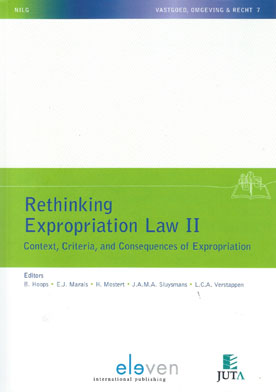
This book is the second of a series in which experts engage critically with the context, criteria and consequences of expropriation. The State, in the shape of monarchies, dictatorships, or democracies, has been using expropriation to implement its policies since the times of ancient Rome. This book therefore contains contributions on the historical context of expropriation. Despite its age, however, expropriation law is constantly evolving at the national and international level.
The contributors show how European human rights law and international soft law instruments shape national criteria and expropriation procedures. They discuss how comparative law and insights from the theory of human flourishing can help to improve the criteria for the justification of expropriation. From comparative and international perspectives, the contributors deal with the criteria that determine whether compensation is due for a regulatory taking, constructive expropriation or excessive regulation of property.
The contributors examine the definition of takings and whether the dissolution of condominium constitutes a taking. They uncover how the amount of compensation can play a role in the justification of expropriation. Lastly, the contributors examine the consequences of expropriation for residential communities.